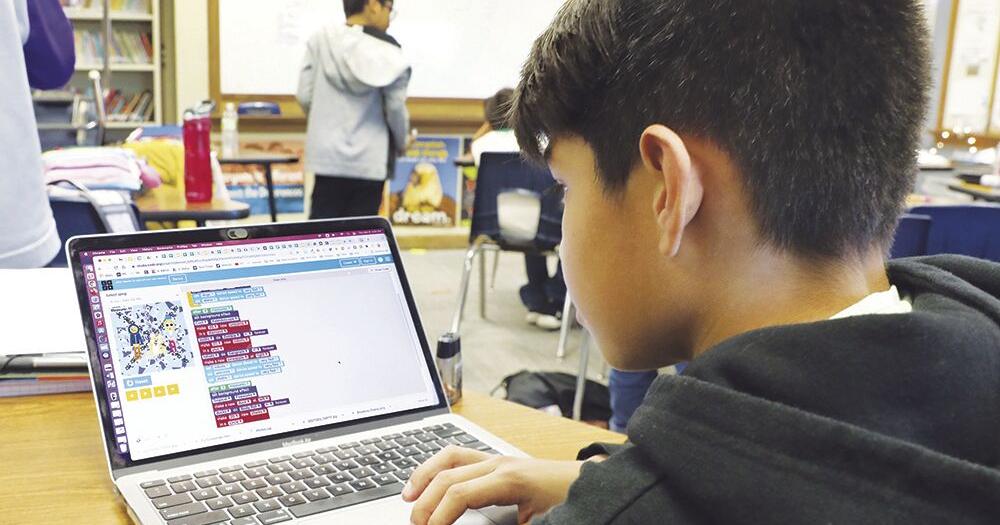Hour of Code: TK through fifth grade students learn how to code computers | News

Denison Community Schools (DCS) students in preschool through fifth grade participated this week in an event called “Hour of Code,” which is an instructional series designed to teach kids about coding computers.
“It’s put on by an online organization called Code.org,” said Darin Johnson, technology integrationist at Broadway Elementary and Denison Elementary.
“They promote having kids code for at least one hour over the course of computer science week, which happens to be this week.”
In 2019, a $50,000 grant through the Computer Science is Elementary project, and funding from the school district paid for the redesign of the Denison Elementary computer lab into a STEM (Science, Technology, Engineering and Mathematics) classroom.
“Since we applied for that grant, we’ve been slowly increasing the amount of computer science we have kids participate in,” Johnson said. “This year, we decided to ramp things up in a couple of ways.”
People are also reading…
The first way was to add preschool kids to the program this year after adding transitional kindergarten (TK) last year.
“So now we basically have preschool all the way through fifth grade taking part in this event,” he said.
“The second way is we’re doing activities that are called ‘unplugged activities’ to reinforce the notion that computer science doesn’t have to always be on a device or online. Computer science is more than just programming and coding a computer; it’s also critical thinking and breaking problems down in order to find a solution.”
Preschoolers didn’t participate in the unplugged activities, but the rest of the students did.
“TK through second grade had a daily activity that they could do that corresponded with our theme of the day,” Johnson said. “The first day we emphasized guarding your private information online. Be careful what you share with strangers. When you’re on sites, or downloading things, you don’t want to share any information that could identify you or let people find you.”
All the unplugged activities the students did on the first day reinforced that notion.
“Tuesday was all about an event; an event is something in a computer program that, when you click a button or you click the mouse, something occurs,” he said. “It’s kind of a cause and effect relationship. All of the daily unplugged activities that we did aligned with that topic for the day.”
The other unplugged topics for the week were algorithm, loop and bug/error day.
“We want them to have a deeper understanding of each of these concepts,” Johnson said.
During the online portions of Hour of Code, the students go to different online sites and learn to code.
“We used to do just Code.org, and then we opened up a year or two ago with a choice board; they can pick other sites, as well,” he said. “They’ve received that very well. Kids are like adults; if you give them a choice, rather than tell them what they’re going to do, they respond better. They can pick something more aligned to their interests.”
All of the various sites emphasize computer programming or computer science in one way or another.
“It’s very much game based,” Johnson said. “To the untrained eye, people would say, ‘Well, these kids are just playing video games,’ but it’s a lot more than that.”
Students learn to persevere while breaking down problems, and they also learn to collaborate with the students around them.
“We’ve found that, no matter what field you go into, if you can’t work with people or you can’t solve complex problems, you’re probably not going to last there very long,” he said.
The push during the week is to get the kids to do as much coding as possible to begin to learn how to make their own creations.
“In technology, in general, we don’t want kids to just consume something that has already been made for them,” Johnson said. “We want them to realize that they have the ability to make it their own – they have the ability to program the computer how they want to.”
The students love Hour of Code week – and the teachers have been coming along, as well, he said.
“In the past, there may have been some classrooms that, when it came time for the coding activities, the teacher would say, ‘Get your computers out,’ and the kids would just code,” Johnson said. “Now, we see the teachers are engaging with it more, too. Some teachers were a little intimidated, but I think they’re getting more and more comfortable with it.”
The schools have been pushing computer science out into all of the classrooms since the Computer Science is Elementary grant was received.
“We want them to see that they can do computer programming during math and reading and science and the other subject areas, too,” he said.
“We know not everyone is going to go on beyond school to be a computer programmer, although that’s a profession that’s very much in demand. They could probably write their own ticket where they want to go and work right now.”






